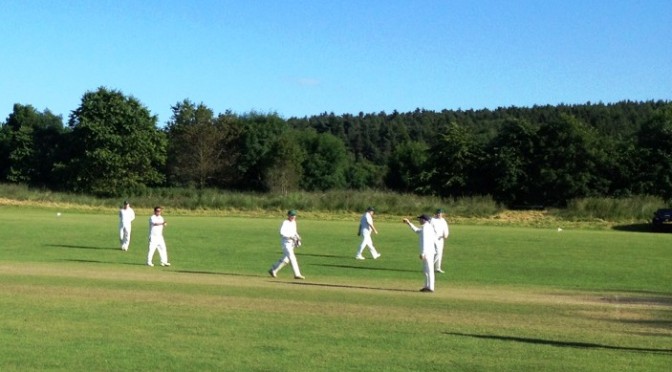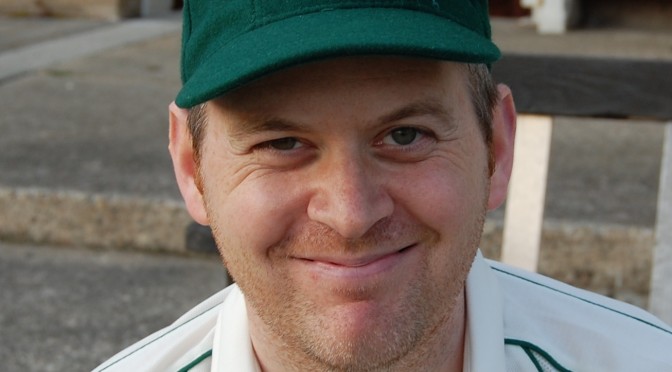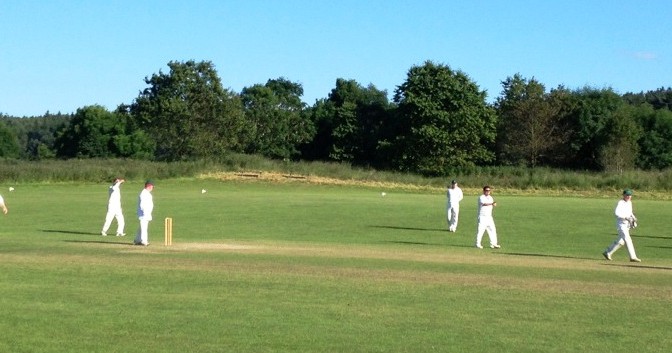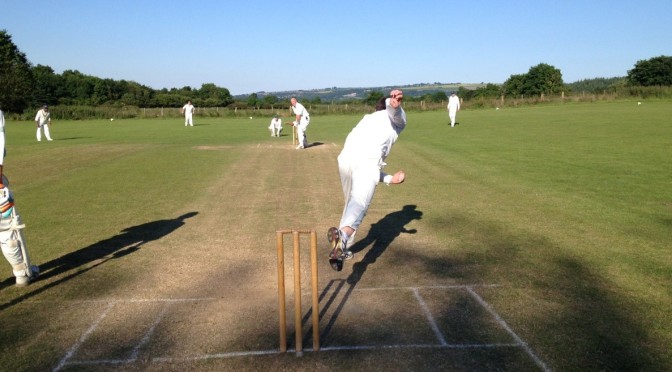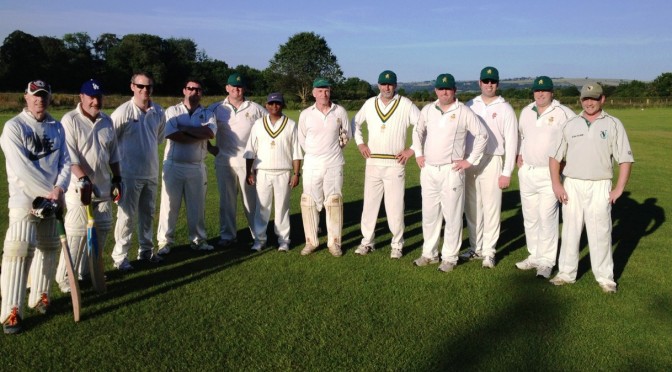Ah Summer, just the word conjures up happy memories…holidays, no school for months, beer gardens, beaches, beer gardens and beaches. I think I need to branch out a bit on my summer activities. What Summer gives us though is the chance to play some cricket, yes, for those 3 glorious weeks of the year, spread out from May to September, the whites can be washed and dried on the line, the outfield can quicken and we can head to our favourite summer retreat, Riding Mill.
In glorious sunshine (the radio reported it to be 27° as I was driving along, it wasn’t, it was 18°) the mighty Mallards, fresh from the victory against the Old Firm, facing Tony Jordan’s Ovington Kestrels.
Captain Stig lost the toss and Ovington decided to bat first, in temperatures that the radio must have by now been comparing to the Atacama Desert. 20 overs of swashbuckling cricket was about to start, but the lack of 3G coverage at Riding Mill meant we couldn’t watch the T20 Bash on Sky Go, so our game started instead.
For the final time this season, Tony Cleaver opened the bowling, with the Ovington openers being Ali Hall and Dave McGuiness. So, for the first time this game, we have a Mallard bowling to two Mallards players, more of this to come later, it gets farcical. Tony got through his first over, with only a wide and a single coming off it. He seemed to get back into his fielding position rather quickly, and could be seen shuffling around in the outfield, at closer glance I could swear this resembled the scene in the Shawshank Redemption as Tim Robbins empties the contents of his pockets down his trouser leg. Presumably Tony was getting rid of any unsold ‘goods’ before returning to Columbia, the bosses do not accept poor sales, even in a recession.
Dave Cox took the new (ish) ball from the Sunshine End, and immediately hit his straps, bowling some great stuff, with the ball nipping through to Beacock at a good pace. Hall did manage to knock a well timed drive through the covers for four though, having kept the strike from the first over.
Cleaver to McGuiness then, Mallard et Mallard, Tony started with a wide, the wily old fox, keeping the batsman guessing. It didn’t quite go to plan as the next delivery went for four. However, as the old saying in Columbia goes “Juemadre” (Google it, it’s quite appropriate), Tony kept his cool and sent down the perfect delivery, swinging back in and clipping the top-of-off, textbook stuff, and McGuiness was on his way back for 4 [wondering if he really should start working on that forward defensive shot – Ed.].
A decent start by Mallards, with only 12 runs coming of the first four overs. The dismissal of McGuiness brought Ball to the crease, who after nurdling his first few scoring shots around began to play his shots, and play them well. Cleaver and Cox continued to bowl well, but with little reward, as the new partnership gathered some pace, coming into the 7th over, the score has pushed on to 38. But of course Cleaver, now in his final over of the season, had something to say about this, bowling the dangerous Hall for 15, gracias senor, gracias.
Ball continued to play well, timing to some great shots of Cox’s final over for a 6 and a 4, and taking a liking to new bowler Perera, swiftly reaching 31 to retire (despite a retirement of 25 being agreed at the toss!). Terry and Ball Jnr were now at the crease, and whilst Terry was happy to knock it around take singles, Ball Jnr was a little more extravagant, launching the following in four consecutive balls 6-4-4-6……show off.
Scott came on at the Sunshine End to replace Cox, and for some reason was managing to find some swing, shaping the ball away from the batsman…….the crease…..and the wicket keeper, with 3 wides off his first over and another of his second. Perera’s struggles continued at the other end, with sun in the eyes of the bowler, and some big hitting from the batsman a recipe for disaster. Captain Stig had his thinking cap on. Ball Jnr followed Ball Snr in retiring on 31, bringing P Terry to the crease. At this point I will explain that the Ovington Team contains a Hall, Ball, Ball, Terry, Terry.
Stig’s sharp captaincy meant that Scott was switched to the one tree end, and Jonny Bennett came on from the Sunshine End. This worked straight away, with P Terry trapped LBW first ball of the over, umpire Taylor taking an eternity to give the decision, but making the right one in the end.
With Jordan replacing Terry, Scott began his two overs from the Field End, again with an immediate impact, trapping Jordan LBW and then in his fourth over removing Jones LBW and M Terry Bowled, his 4 overs going for 12 runs and 3 wickets, all hail captain Stig.
By now the run rate had slowed dramatically, after being on 106 after 13 overs, Mallards had kept them to 124 as the last over began. The two batsman you ask? That would be Colin Haylock and Andy Dunhill, told you this gets farcical, but stay with me, it gets even better. Haylock requested a “4 and a 1” from Dunhill in the previous over, who duly delivered, before the innings closed on 126 [allegations of match fixing and spot betting manipulation were made by Cox – disappointed that he hadn’t been included in the cabal – Ed.].
Kent and Boyes opened for Mallards, whilst Dunhill opened for Ovington (??), Kent pulling the first ball of the innings for four. Mallards went about the run chase calmly, keeping the score ticking over but finding boundaries difficult. Terry bowling some tidy stuff from the Sunshine End and removing Boyes for 2. Dunhill was replaced after 2 overs by McGuiness, who bowled some good stuff, including a wicket maiden that removed Kent for 18, clean bowled. Terry bowled though his 4 overs with no further wickets, going for 15 runs, and was replaced by Haylock. Was this meant was that SEVEN of the first THIRTEEN overs had been bowled by Mallards. This is surely a new record?
By now, Buckley and Cox were at the crease, with the game in the balance as we reached 44 off 10 overs, at this stage Ovington were 83. “We just need a few good overs” came the expert punditry from Bennett on the boundary, Atherton and Lloyd have nothing to worry about. However, this pundit proved to be spot on, with a few good overs arriving, Cox displaying some supreme timing and striking to race his way to retirement with 32. Buckley and new batsman Stig continued to keep up the scoring rate, with Stig hitting the ball with some power and Buckley using good timing to find the boundaries more and more. After being on 44 after 10 overs, Mallards, were 108 after 16.
By now Buckley had retired on 31 and Bennett was at the crease, trying to work out how he could be on strike to hit the winning runs. He had been joined by Perera, after Stig was bowled for 19, off the bowling of Dunhill, who had come on the time from the Sunshine End to finish off his spell, the treacherous dog. J Ball replaced Dunhill, and given that he looked a very very decent bowler, Bennett knew what to do, as an experienced player, pinch a quick single and get down to the other end as fast as possible to calmly enjoy the evening sun from the safety of the non-strikers end. The meant that the unfortunate Perera ended up facing Ball with the need to keep up the scoring crucial. A tough ask. Ball had him caught behind for 0.
Beacock and Bennett at the crease, two overs left, 8 runs needed. The score had been helped along by a disastrous over from Jones from an Ovington perspective, going for 18 runs at a crucial stage in the game. Haylock stepped to up to bowl his last, and the 19th over of the game. And what an over, only a single and a wide coming from it, with Colin bowling a great line and length to contain the batsman.
Into the last, 6 to win, Ball bowling from the Sunshine End. Single off the first from Bennett, single of the third from Beacock, 4 to win from 3 balls. Ball send down a short pitched ball that Bennett is able to pull away behind square for four. Game Over. Phew.
A really good game of cricket, with everyone getting a chance to contribute with either bat or ball, and a good run chase coming down to last over.
A good send off to Tony for another year, Tony it’s been fantastic to play cricket with you again this Summer, we all wish you a safe trip back to Colombia, where the atmosphere must be electric given their World Cup performances, looking forward to next year.
A good turn out in The Wellington saw us receive some well earned Roasties and Gravy, just the job.
Finally, I will be adding a Man of the Match to my match reports. And this is a difficult one. Cox & Buckley both retired, Bennett for the winning runs and some tidy bowling? Captain Stig for sticking with his game plan and getting the rewards? Tony Cleaver for two wickets on his last appearance this year? Decisions, Decisions…..
Man of the Match: C Scott (match reporter)


